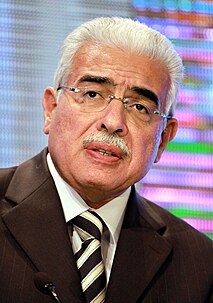 |
|---|
| This article is part of a series on the politics and government of Egypt |
| Constitution (history) |
Government |
Legislature |
| Political parties (former) |
Elections for the Shura Council , the upper house of the Egyptian parliament, was held in Egypt on 11 June 2007 and 18 June 2007. From a total of 264 seats 88 are up for election every three years, another 44 are appointed by the president.

The Shura Council was the upper house of the formerly bicameral Parliament of Egypt. Its name roughly translated into English as "the Consultative Council". The lower house of parliament is the House of Representatives. The council was abolished by the 2014 constitution.

The Parliament of Egypt is currently a unicameral legislature. The Parliament is located in Cairo, Egypt's capital. Under the country's 2014 constitution, as the legislative branch of the Egyptian state the Parliament enacted laws, approved the general policy of the State, the general plan for economic and social development and the general budget of the State, supervised the work of the government, and had the power to vote to impeach the President of the Republic, or replace the government and its Prime Minister by a vote of no-confidence.

Egypt, officially the Arab Republic of Egypt, is a country spanning the northeast corner of Africa and southwest corner of Asia by a land bridge formed by the Sinai Peninsula. Egypt is a Mediterranean country bordered by the Gaza Strip and Israel to the northeast, the Gulf of Aqaba and the Red Sea to the east, Sudan to the south, and Libya to the west. Across the Gulf of Aqaba lies Jordan, across the Red Sea lies Saudi Arabia, and across the Mediterranean lie Greece, Turkey and Cyprus, although none share a land border with Egypt.
There were 587 candidates competing for the 88 seats in 24 provinces. The main parties running were the National Democratic Party (109 candidates) and the outlawed Muslim Brotherhood (whose 19 candidates were standing as independents, President Mubarak having had failed in an attempt to disqualify 17 of them). The elections were being boycotted by the New Wafd Party and the Nasserist Party. [1]

The National Democratic Party, often simply called in Arabic: الحزب الوطني Al-Ḥizb al-Waṭaniy – the "National Party", was an Egyptian political party. It was founded by President Anwar El Sadat in 1978.

Muhammad Hosni El Sayed Mubarak is a former Egyptian military and political leader who served as the fourth President of Egypt from 1981 to 2011.

The New Wafd Party, also known as the Al-Wafd Party, is a nationalist liberal party in Egypt.
Egyptian media reported that 11 of the 88 seats were won uncontested by the National Democratic Party. [1] In total, the NDP won 70 seats in the first round of the election, while one seat went to an independent and one to the National Progressive Unionist Party (commonly known as "Tagammu"). Turnout was reportedly 23 per cent. [2] Of the 16 seats determined in the second round, the NDP won 14 while independents won another two, resulting in a total of 84 for the NDP, three for independents and one for Tagammu. [3]

The National Progressive Unionist Party is a socialist political party in Egypt. Originally known as the National Progressive Unionist Organization, it was established as the left-wing faction of the governing Arab Socialist Union (ASU) and became an independent party the ASU's dissolution.
Violence on election day led to the death of a supporter of an independent candidate in Sharqia province after fighting with supporters of the NDP. [1]

Sharqia Governorate is the 3rd most populous of the governorates of Egypt. Located in the northern part of the country, its capital is the city of Zagazig.



